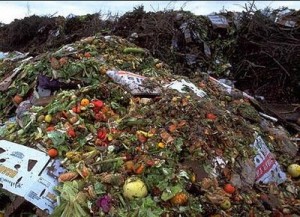
Biofuel from food and plant waste
Biofuels made from plant waste and municipal trash rather than food crops could replace more than half of gasoline used in the European Union by 2020, Bloomberg New Energy Finance said.
The 27-nation bloc could produce 90 billion liters (24 billion gallons) of next-generation ethanol in 2020, or about 65 percent of predicted fossil gasoline consumption, the London- based research group said today in a study. At least 100 refineries a year could be built in the region from 2013, according to the report.
[ad]
The EU currently has no commercial factories that refine biofuels from plant waste. European agriculture “can benefit from a new bioenergy industry as farmers will have an extra revenue source, increasing the euros-per-hectare ratio for every piece of land,” said Roberto Rodriguez Labastida, a co-author of the report.
While the EU industry may be worth an annual 31 billion euros ($40 billion) by 2020, the bloc has no target for making next-generation biofuels, and a business-as-usual approach would see revenue of 522 million euros, 1.7 percent of the potential, Rodriguez said. European companies making ethanol include Spain’s Abengoa SA and CropEnergies AG of Germany.
Today’s report was commissioned by Novozymes A/S and Royal DSM NV, both of which produce enzymes used to catalyze reactions during the production of second-generation biofuels. Novozymes Chief Executive Officer Steen Riisgaard said in a July interview that Europe is lagging behind the U.S., China and Brazil in developing fuels from plant matter.
“The next generation biofuel is heading for deployment,” Riisgaard said today in an interview with Bloomberg Television. “In the U.S. a lot of government initiatives have been taken with mandates on certain amounts of biofuel to be consumed. There are also government incentives for the financing and collection of biomass.”
EU Lagging
The main barrier to the growth of the industry is an “uncertain policy environment with no clear incentives,” according to the report, which said the EU’s first priority should be to bring in a U.S.-style mandate for the bloc to derive a certain percentage of transport fuels from the fuels.
The union has a target of deriving 10 percent of transportation fuel from biofuels by 2020. It has no target for next-generation ethanol, which doesn’t use food crops.
Under a 2007 law, the U.S. is required to use 36 billion gallons of ethanol in 2022, 16 billion of it coming from next- generation biofuel.
“With the current regulatory framework, the EU is likely to underperform, leaving most of its potential in the ground and, most importantly, its companies behind the U.S. and Brazil,” Rodriguez said. “A change in direction is needed if the EU is going to be a leader.”
Under the business-as-usual scenario, there will be 15 refineries making biofuels from plant waste by 2020, compared with 946 in a “bullish” case, according to the study. Rodriguez said the more optimistic scenario could be achieved by using municipal waste and just 25 percent of crop and forestry waste, allowing the rest to stay in the soil, providing nutrients.
Land Grab
The push for the fuels is clouded by a debate over whether it competes with farmland used for food production.
European companies including Portugal’s Galp Energia SGPS SA, the U.K.’s D1 Oils Plc and Sun Biofuels Ltd. and Agroils Srl of Italy are among firms from around the world that have bought African land amounting to more than the size of the Netherlands as they push to grow non-food crops such as jatropha to make biofuels, the environmental group Friends of the Earth said last month, warning of food displacement.
“With next-generation technologies, this can be avoided as they tap into currently unused feedstock,” Rodriguez said, referring to the leftover portions of food crops and waste.
Source Bloomberg

